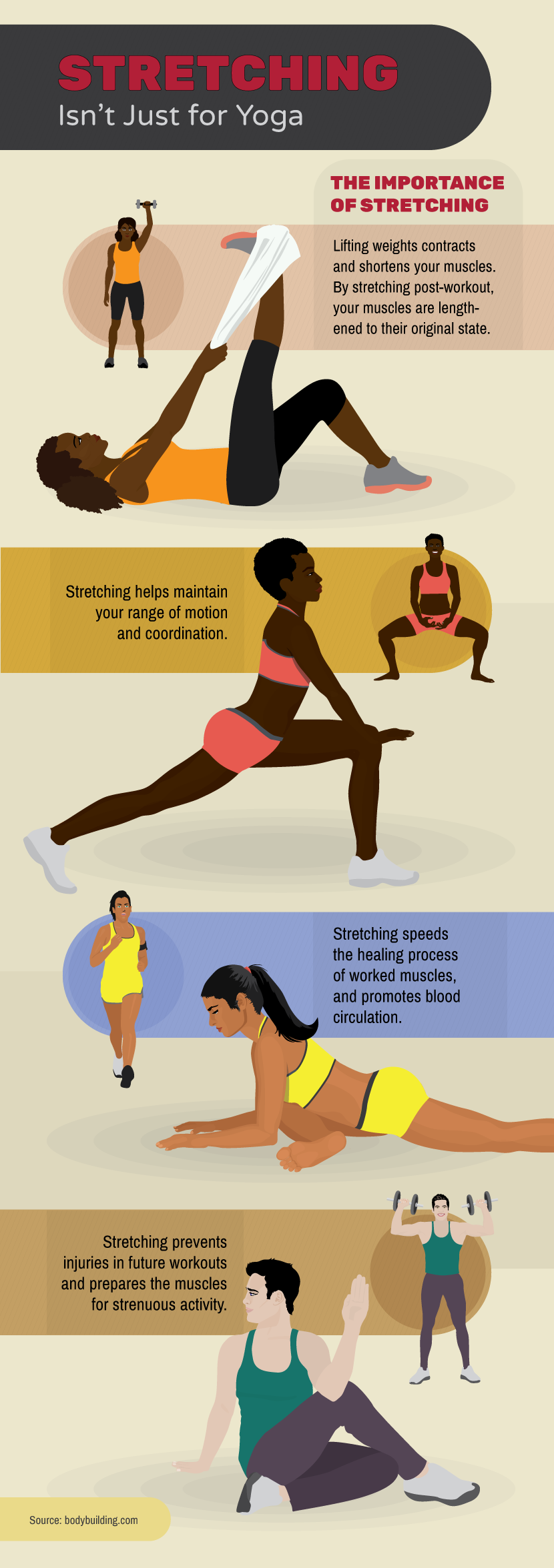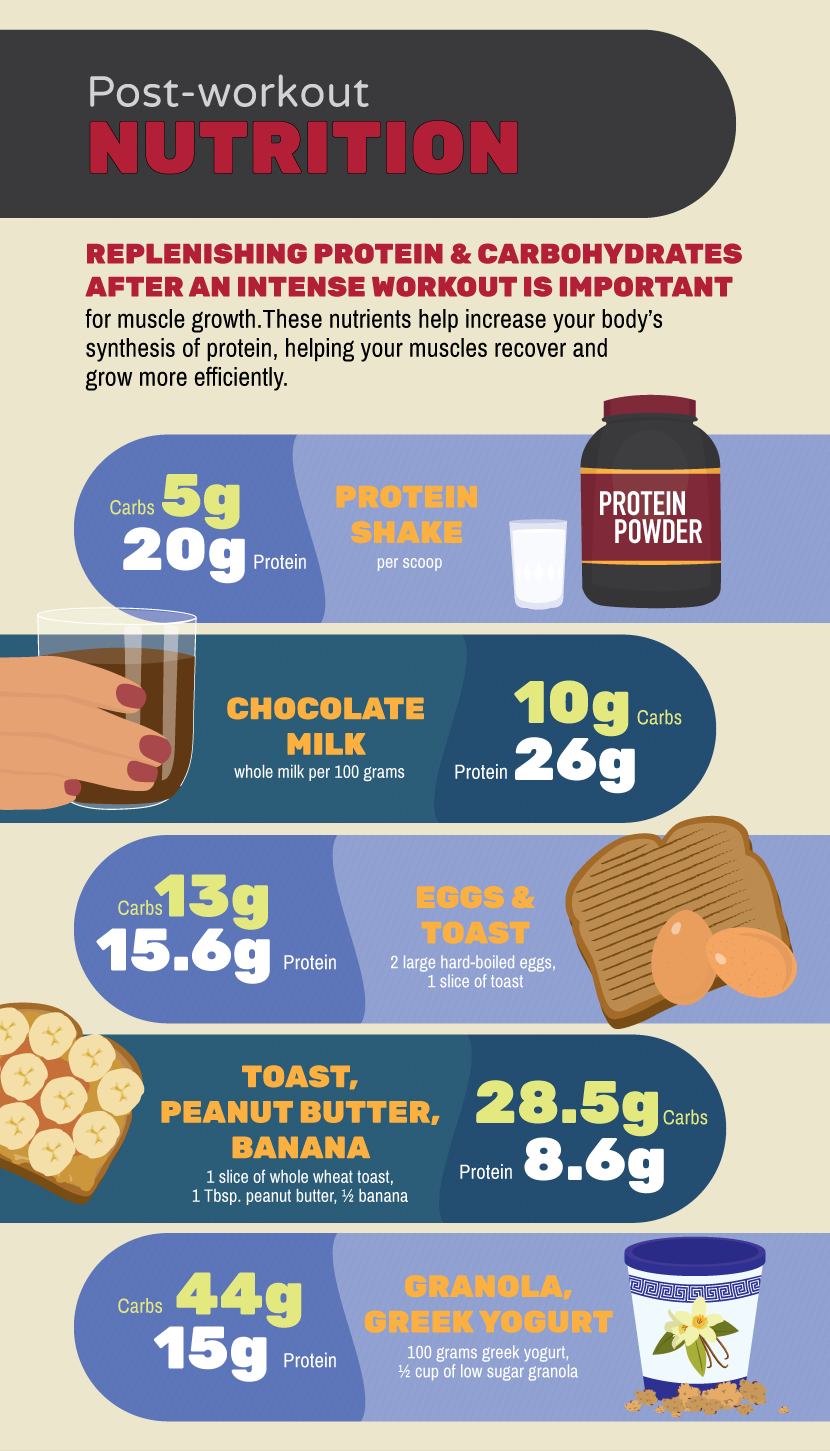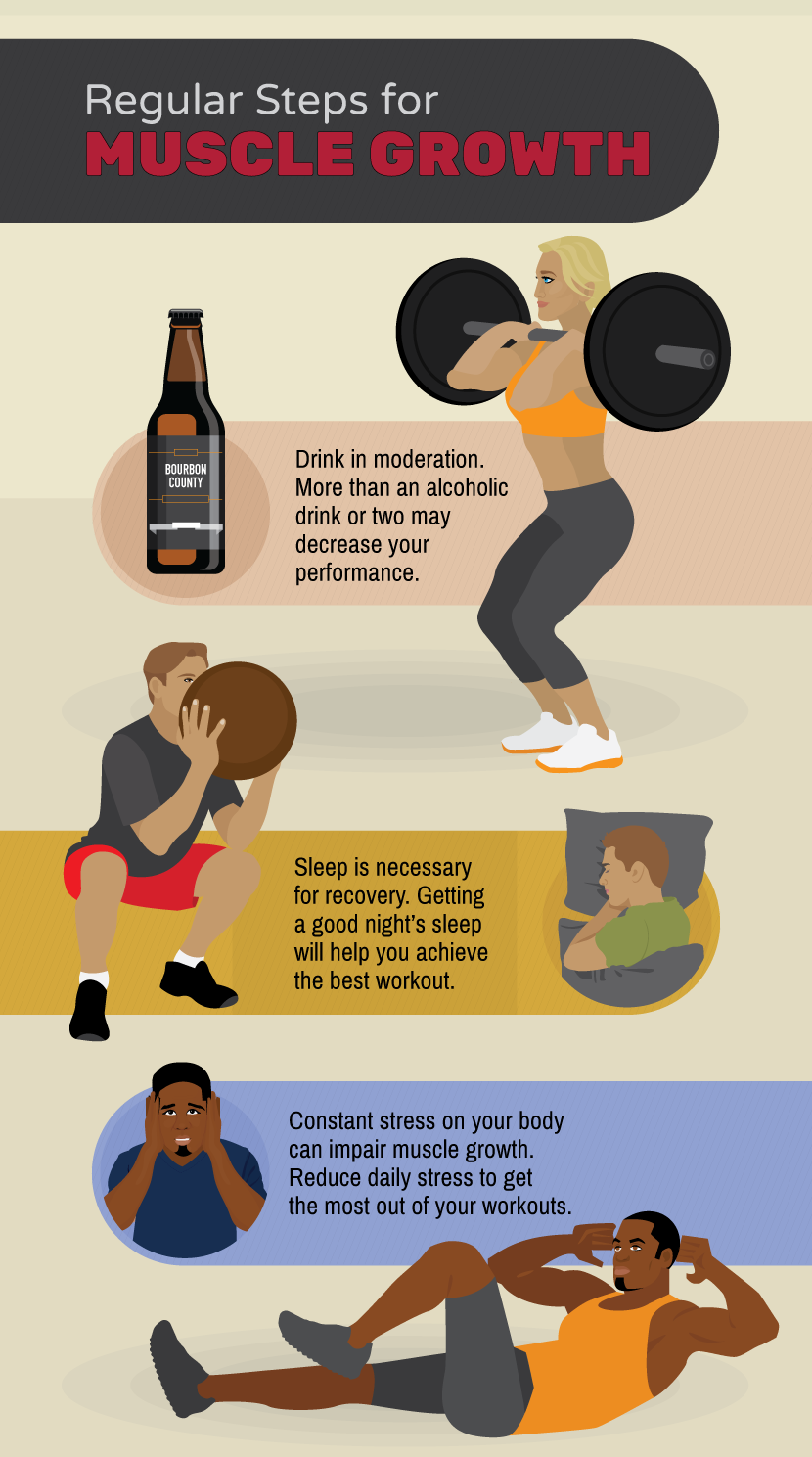Post-Workout Recovery for Muscle Growth
So, you want to grow your muscles. Maybe it’s because you want to bulk up. Perhaps it’s because you want to feel stronger.
Or, it could be because you know that the more muscle you have, the higher your metabolism will be, and the more efficiently
you’ll burn fat. Regardless, all you must do to grow muscles is lift weights, right? Wrong! Well, at least, sort of wrong.
It’s true that lifting weights – especially heavy weights – helps you grow muscles, but there are other things you can do as
part of your post-workout recovery to increase your muscle growth. Let’s talk about the post-workout recovery window.
0-15 minutes post-workout
You’ve re-racked your weights and cleaned off the bench you were using (seriously, do it) and it’s time to hightail it out
of the gym. Not so fast! Even with a lifting workout, your body needs some time to cool down. One great way to do this is by
stretching.

Stretching right after finishing a lifting workout not only helps bring your heart rate back to normal, it increases
circulation to your muscles and helps return them to their normal position. During a lifting session, the muscles you use
contract, making them tighter. While this contraction is one of the ways you ultimately get stronger, not stretching your
muscles back out can lead to a decreased range of motion and flexibility, which could then lead to injury. Decreased range of
motion might also actually impair your lifting. After all, if your calves are tight, you may not be able to get full range on
your squats.
Increased circulation due to stretching also means more oxygen to your muscles; oxygen is what helps break down the
nutrients your muscles require for energy. While you don’t have to stretch every muscle in your body after every workout,
be sure to stretch the ones you focused on during your lifts and any others that feel particularly tight.
15-30 minutes post-workout
Speaking of the nutrients your muscles require for energy, now’s the time to replenish them! Within the first 30 minutes
of a workout is the optimal time to take in some protein and carbohydrates. While research has shown that your body will
continue to use nutrients to replenish your muscles for at least 24 hours, the rate of absorption changes. Research has shown
that the first 30 minutes post-workout is important because the body's cells are most receptive to replenishment within that
timeframe after intense training.
Why protein and carbohydrates? Do you really need both when protein synthesis is what leads to muscle growth? For optimal
results, you need both. While protein synthesis leads to muscle growth, research has shown that insulin promotes protein
synthesis. This means that by combining your post-workout protein with carbohydrates, especially high glycemic carbohydrates
that increase insulin, the theory is that you will further increase protein synthesis. More protein synthesis equals faster
recovery time for your muscles and more muscle growth.

It is important to note that there is some debate about whether you need fast-acting carbohydrates or more complex
carbohydrates post-workout, but one study suggests the type is less important than the simple fact that you consume something.
There have also been recent questions about whether all groups of people respond to the carbohydrate and protein
combination the same way, with at least one study showing that when comparing a group of older men consuming protein and
carbohydrates after a workout with a group consuming only protein, the differences after a few hours were nonexistent.
Notably, there is also a debate about the source of protein post-workout. While the recommendation previously was to get
your post-workout nutrients from a drink for best results, and recent recommendations are to get your post-workout nutrients
from whole foods, it really comes down to what you’re most likely to actually do post-workout. Do what is most convenient
and you’re more likely to stick to the routine.
1+ hours post-workout
While it’s easy to remember to drink water right after a sweaty workout, it isn’t as easy to remember it an hour or two
later. Now is the time to remind yourself to hydrate continually throughout the day and to make sure you’re replenishing
the electrolytes you lost through sweat during your workout.
Why not just chug a ton of water right after your workout and be done with it? One reason is that drinking water more
quickly than your body can absorb it post-workout can actually result in overhydration. By replenishing water in small
amounts over 24 hours, your body has time to utilize and eliminate the fluid.
You may be wondering if you really need electrolytes as part of your hydration plan. Electrolytes are excreted in your
sweat during a workout. Diminished electrolytes can lead to cramping, fatigue, and nausea. In addition to the immediate
symptoms, not replenishing electrolytes can also affect your next workout, keeping your lifts from being as strong as they
could be. According to research, “for effective restoration of fluid balance, the consumption of a volume of fluid in excess
of the sweat loss and replacement of electrolyte, particularly sodium, losses are essential.”
24-48 hours post-workout
Now is the time you’re likely to start feeling some Delayed Onset Muscle Soreness (DOMS) from your workout. While some
soreness after a workout is normal, especially if you’re new to lifting or training in a new way, now is not the time to
stress those same muscles again. While you do not have to take a complete rest day from workouts overall, it is important
to either decrease the intensity of your workouts or train a different muscle group on subsequent days.

Why does it matter? One theory for why people get DOMS (and there are several) is that it is a result of the microscopic
tears in your muscles experienced during a workout. These tears in muscle, and the subsequent rebuilding through protein
synthesis that results in thicker tissue, is what ultimately makes muscles grow. That, however, requires rest and recovery
of the muscles so they have adequate time to rebuild. If, instead, you train the same muscles over and over every day, your
muscles have no time to recover and instead continue to break down. Rather than getting stronger, you place extra,
unnecessary strain on your body.
In the weeks and months that follow
Take de-load weeks – If you’ve been lifting for a while, you may have noticed that at some point it feels like you’ve hit
a stall or plateau. This is because muscle growth and the body’s response to exercise are not linear. In addition to taxing
your muscles during a workout, you also tax your nervous system. After a while, you may experience central nervous system
fatigue during which your body just needs a break. Instead of taking time completely off from your workouts, you may be able
to take a de-load week. Athletes in many sports do this – think about the way marathon runners taper before the race.
By de-loading the stress on the body, performance actually increases on the day of the marathon or on your next lift.
For heavy lifters, this means decreasing the amount of weight you’re lifting. Consider reducing the weight to 50 percent of
your max during your de-load week to allow your body to reset and prepare for more work.

Cut back on alcohol - While one or two drinks at happy hour after a workout aren’t going to do too much to inhibit muscle
growth, more than that can lead to decreases in performance. What’s the point in putting in all that work if you’re just
going to undo it at the bar afterward? Besides, cutting down on your alcohol consumption has many health benefits and all
the health benefits of beer and wine have been observed at one or two drinks anyway.
Get adequate sleep – Getting a good night’s rest is important any time, but if you’re trying to grow muscle it’s
especially important. Just like letting your muscles rest the day after an intense workout helps with tissue repair,
a good night’s sleep is when even more repair and growth will happen. Researchers hypothesize this is because losing out
on sleep decreases protein synthesis, which, as we know, is required for muscle growth. Who knew you were actually building
muscle while you sleep?
Reduce stress – Not all stress is created equal. After all, it’s stress on the body in the form of lifting weights that
enables us to grow muscles in the first place. That said, chronic stress from your job or another source can hinder your
muscle growth because it hinders recovery. If your body is too busy dealing with the chronic stress of everyday life, it
won’t be able to focus efforts on muscle building. Take steps to reduce the stress in your life through massage, meditation,
yoga, or other means to allow your body to deal with the short-term stress you’re placing on it with exercise.
Growing muscles isn’t just about how hard you work in the gym, but what you do for recovery in the hours, days, and
months post-workout. Next time you hit the gym hard, think about how you can get the most out of your workout by taking care
of your body afterwards.
Embed the article on your site

